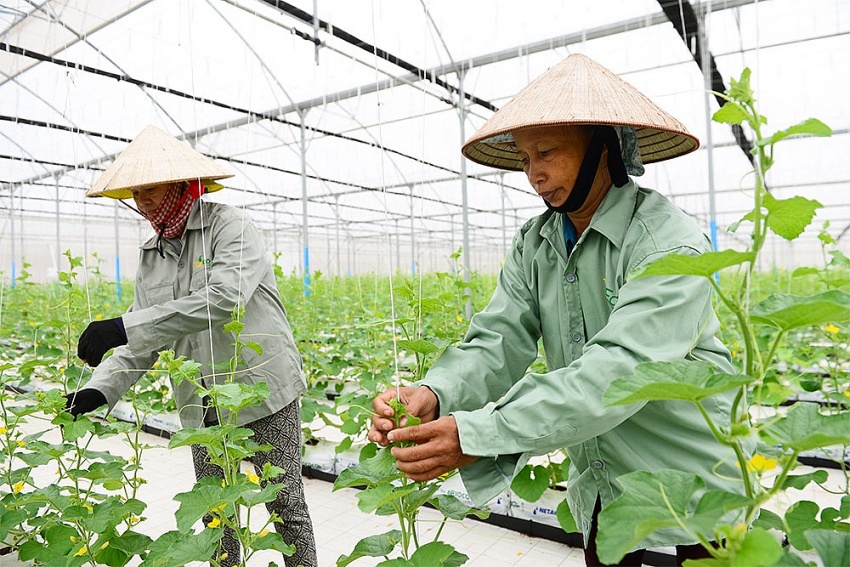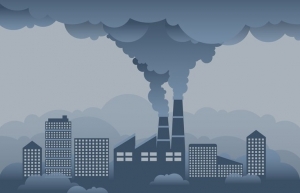Low-carbon answers reach agriculture
In mid-May, HUSK, a Cambodian biochar and biofertiliser company, raised $5 million from Mekong Enterprise Fund IV. With the new funding, HUSK will build a network of distributors in 2024 to ensure its carbon-based fertilisers reach farmers in key sectors, focusing initially on the rice and coffee value chains as well as the high-value horticulture sector.
 |
| Investment funds are seeking out local and foreign businesses to help decarbonise the agricultural sector, Photo: Le Toan |
Heloise Buckland, CEO and co-founder of HUSK, said, “Our products help to both reduce synthetic fertilisers and build soil organic carbon, which is a significant contribution to the government’s goal of developing low-emission, high-quality rice. In addition, our granulated products for rice, in combination with our natural pest control products, help to achieve low residue rice which sells for a higher price in export markets.”
HUSK will work closely with Can Tho University in the Mekong Delta city of Can Tho and other research centres to run third-party verified trials to gather key data on the impact of its products on low emission farming and net revenue for farmers. By 2026, the company will have its first operating site up and running for both national consumption and from 2027 start to export to other countries in the region.
“Vietnam currently consumes 11 million tonnes of fertilisers and given that approximately 35 per cent of these are organic, there is a huge demand for organic fertilisers which is not yet being met by local production,” Buckland said.
In early May, Rize, a Singapore-based agritech platform working towards making rice cultivation sustainable, raised $14 million in a Series A funding round, co-led by Breakthrough Energy Ventures, GenZero, Temasek and Wavemaker Impact. “Thanks to our latest investment, we are in a strong position to significantly scale our initiatives and make a substantial impact,” said CEO Dhruv Sawhney.
Its primary focus for 2024 and beyond is to enhance collaborations with local agronomists, farmers, and institutions in Vietnam. A key partnership has been established with Can Tho University, which aims to leverage the university’s R&D capabilities to tailor sustainable farming practices to the specific needs of the region.
Looking ahead, Rize’s goal is to expand its reach to over 150,000 farmers across markets.
Sawhney noted that Vietnam presents a strategic and compelling opportunity for innovative startups like Rize. “Despite this, the traditional rice farming practices prevalent in Vietnam are both economically and environmentally unsustainable. Smallholder farmers, who form the backbone of Vietnam’s rice production, often rely on antiquated methods that are not only inefficient but also contribute significantly to greenhouse gas emissions,” Sawhney said.
Moreover, Vietnamese smallholder farmers face significant challenges such as lack of access to precise data and high input costs, which hinder their ability to adopt more sustainable and productive farming techniques.
“By introducing innovative and sustainable farming solutions tailored to the specific needs and conditions of Vietnam, Rize aims to transform the agricultural landscape. Our goal is to enhance productivity, reduce environmental impact, and improve economic stability,” Sawhney added.
Besides foreign companies, local groups are also on the radar of investment funds by offering solutions to decarbonise the agriculture sector. In April, CAS Energy and Beacon Fund reached an initial investment agreement in April to advance renewable energy projects integrated with circular agriculture under the climate-smart agriculture model in Vietnam.
CAS Energy will leverage this investment to develop rooftop solar projects coupled with climate-smart agriculture. This collaboration supports Vietnam’s renewable energy and sustainable agriculture objectives and creates jobs for farmers in such localities as Ninh Thuan and Dong Nai.
“Beacon Fund’s investment will propel CAS Energy towards a green, and equitable future while opening doors for further collaboration with other impact investors,” said CEO Nguyen Pham Cam Tu.
Also in the same month, Vietnam’s innovative sand battery startup Alternō bagged over $1.5 million in an oversubscribed round to cut carbon emissions in agriculture. The round was co-led by The Radical Fund (Singapore) and Touchstone Partners (Vietnam), with participation from Antler (Vietnam), Impact Square (South Korea), and Glocalink (Singapore) along with grants from international organisations.
Hai Ho, co-founder and chief commercial officer of Alternō, told VIR that the trend of funding Vietnamese climate tech startups is bolstered by a strong commitment to environmental sustainability and the pressing need to address significant carbon emissions challenges.
“This unique scenario has positioned Vietnam as a prime destination for impact investors, who are increasingly attracted to the region’s dedication to fostering innovations,” Ho said. “As global and local investors recognise the potential for meaningful climate action through technology, the flow of capital into Vietnamese climate tech ventures continues to grow.”
 | Vietnam emerging as market for British agriculture companies Vietnam presents a great opportunity for UK businesses to boost their exports of agriculture, food, and drink products. |
 | Experts tackle nation’s sustainable reporting International organisations and associations are working with banks to arrange green finance for the business community, including agriculture, and simultaneously support them to access these crucial capital resources. |
 | Carbon capture must quadruple by 2050 to meet climate targets: report By 2050, humanity must durably remove four times as much CO2 from the air as today to cap global warming below the crucial target of two degrees Celsius, researchers said Tuesday. |
What the stars mean:
★ Poor ★ ★ Promising ★★★ Good ★★★★ Very good ★★★★★ Exceptional
 Tag:
Tag:
Related Contents
Latest News
More News
- Masan Consumer names new deputy CEO to drive foods and beverages growth (February 23, 2026 | 20:52)
- Myriad risks ahead, but ones Vietnam can confront (February 20, 2026 | 15:02)
- Vietnam making the leap into AI and semiconductors (February 20, 2026 | 09:37)
- Funding must be activated for semiconductor success (February 20, 2026 | 09:20)
- Resilience as new benchmark for smarter infrastructure (February 19, 2026 | 20:35)
- A golden time to shine within ASEAN (February 19, 2026 | 20:22)
- Vietnam’s pivotal year for advancing sustainability (February 19, 2026 | 08:44)
- Strengthening the core role of industry and trade (February 19, 2026 | 08:35)
- Future orientations for healthcare improvements (February 19, 2026 | 08:29)
- Infrastructure orientations suitable for a new chapter (February 19, 2026 | 08:15)




















 Mobile Version
Mobile Version